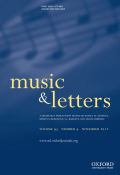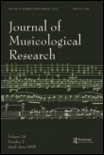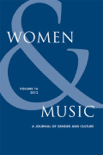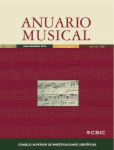
Studia Universitatis Babes-Bolyai Musica
Scope & Guideline
Elevating Music Studies with Rigorous Research
Introduction
Aims and Scopes
- Musicology and Historical Analysis:
The journal emphasizes research in music history, exploring the evolution of different genres, styles, and composers, particularly in the context of Eastern European music traditions. - Performance Practice and Interpretation:
A significant focus is on the analysis of performance practices, including the interpretation of classical works and the pedagogical methods that enhance musicians' skills. - Interdisciplinary Approaches:
The journal encourages interdisciplinary studies that connect music with other fields, such as psychology, technology, and cultural studies, reflecting on the broader impact of music on society. - Choral and Vocal Music:
There is a consistent focus on choral and vocal music, particularly within the context of Romanian and Eastern European traditions, highlighting both historical and contemporary practices. - Innovations in Music Education:
Research on music education practices, including the integration of modern technologies and methodologies, is a central theme, aiming to enhance teaching and learning in music.
Trending and Emerging
- Interdisciplinary Music Research:
There is a growing trend towards interdisciplinary approaches that explore the intersections of music with technology, psychology, and cultural studies, reflecting a contemporary academic interest in the multifaceted nature of music. - Innovations in Music Education:
An increasing number of studies are examining innovative methodologies and technologies in music education, such as the use of digital platforms and interactive teaching techniques. - Analysis of Contemporary Composers:
Research dedicated to analyzing the works and contributions of contemporary composers, particularly those from Eastern Europe, is emerging as a significant theme, reflecting a shift towards modern musical narratives. - Music and Mental Health:
There is a rising interest in the therapeutic aspects of music, particularly in relation to mental health and music therapy, which indicates a growing recognition of music's role in well-being. - Cross-Cultural Musical Exchange:
The journal is increasingly featuring studies on cross-cultural exchanges in music, exploring how different musical traditions influence each other in a globalized context.
Declining or Waning
- Traditional Folk Music Studies:
Research specifically focused on traditional folk music seems to be less frequent, possibly overshadowed by contemporary music trends and innovations. - Classical Music Performance Techniques:
There has been a noticeable decline in studies solely dedicated to classical performance techniques, as more emphasis is placed on innovative and interdisciplinary approaches. - Historical Music Criticism:
The journal's historical music criticism appears to be waning, with fewer papers analyzing past critiques or the evolution of music criticism as a scholarly discipline. - Local Music Practices:
Studies focusing exclusively on local or regional music practices, especially those that do not engage with broader cultural or theoretical frameworks, are less represented.
Similar Journals

MUSIC & LETTERS
Charting New Territories in Music and Literary StudiesMUSIC & LETTERS, published by Oxford University Press, is a prominent academic journal that has been at the forefront of musicology and music studies since its inception in 1920. With an ISSN of 0027-4224 and an E-ISSN of 1477-4631, the journal provides a platform for scholarly articles that explore the rich interplay between music and literature, contributing significantly to the understanding of musical context, form, and societal impact. As of 2023, it holds a respectable Q3 rank in Music within its category, positioned at Rank #66 out of 180 in the Scopus Arts and Humanities Music category. Despite not being an Open Access journal, its rigorous peer-review process and commitment to high-quality research make it an essential resource for researchers, professionals, and students alike. The journal's scope encompasses various genres and historical periods, ensuring a comprehensive examination of music's role in culture and community, thereby enhancing the scholarly discourse within this vibrant field. Based in the United Kingdom, at Great Clarendon St, Oxford OX2 6DP, England, MUSIC & LETTERS continues to inspire and inform the global music scholarly community.

ACTA MUSICOLOGICA
Advancing Musical Scholarship and DiscourseACTA MUSICOLOGICA, published by the International Musicological Society, stands as a pivotal journal within the field of Musicology, garnering attention from scholars and practitioners alike. With its ISSN 0001-6241, the journal serves as a vital platform for innovative research and discourse from 2002 to 2013 and again from 2016 to 2024, achieving a Q2 ranking in the 2023 Music category. Reflecting a commitment to excellence, it ranks #105 out of 180 in Arts and Humanities Music according to Scopus, placing it at the 41st percentile among its peers. Although not open access, ACTA MUSICOLOGICA ensures the dissemination of significant musical research, fostering scholarly exchange and exploration. This esteemed publication is essential for researchers, professionals, and students looking to deepen their understanding of musicology and contribute to ongoing academic conversations.

JOURNAL OF MUSICOLOGICAL RESEARCH
Contributing to the Evolution of Musicological DiscourseJOURNAL OF MUSICOLOGICAL RESEARCH, published by Taylor & Francis Ltd, is an esteemed platform that delves into the field of musicology, contributing to the ongoing dialogue in music research and scholarship since its establishment in 1979. With an ISSN of 0141-1896 and an E-ISSN of 1547-7304, this journal serves as a vital resource for researchers, professionals, and students, offering insights into diverse musicological topics. Although currently categorized in Q4 in Music with Scopus rankings placing it at #110 out of 180 in the Arts and Humanities field, its commitment to excellence and broader discourses in music studies is evident. The journal does not have Open Access options, yet it provides accessible content through reputable academic channels, fostering scholarly exchanges within the community. It aims to publish high-quality research that advances understanding of musical practices and cultural implications, making it a critical resource for those passionate about music and its myriad influences.

Women and Music-A Journal of Gender and Culture
Empowering Voices Through Music and Gender StudiesWomen and Music: A Journal of Gender and Culture is a pioneering academic journal published by University of Nebraska Press, focusing on the intersection of gender and music. With a commitment to exploring issues pertinent to women and music in a range of cultural contexts, this journal provides a critical platform for scholars, musicians, and educators to share research that enriches our understanding of gender dynamics within the music industry and music's role in society. While currently not an open-access journal, it aims to make significant contributions to gender studies, cultural studies, and musicology, attracting a dedicated readership from various backgrounds. The journal is essential for those interested in feminist musicology and gender representation in the arts, fostering discourse that challenges traditional narratives and promotes inclusive scholarship. By bringing together diverse perspectives and innovative research, Women and Music continues to push boundaries and foster important conversations within both academic and artistic communities.

REVUE DE MUSICOLOGIE
Fostering Scholarly Dialogue on Music's LegacyREVUE DE MUSICOLOGIE is a prominent academic journal dedicated to the diverse field of musicology, published by EDITIONS TRANSATLANTIQUES in France. With an ISSN of 0035-1601, this journal has been a key platform for researchers and scholars since its inception, fostering scholarly discourse and advancing the understanding of music's cultural, theoretical, and historical dimensions. Although it currently holds a Q4 category in Music according to the 2023 quartiles and is ranked #140 in the Scopus Arts and Humanities Music category, REVUE DE MUSICOLOGIE continues to publish valuable insights that contribute to the global musicological landscape. The journal does not offer open access, adhering to standard subscription models. Its primary objective is to provide a rigorous forum for original research articles, reviews, and theoretical discussions, making it an essential resource for academics, professionals, and students in the field of musicology. Located at 50 RUE JOSEPH DE MAISTRE, 75018 PARIS, FRANCE, it promises to remain a vital part of music research through 2023 and beyond.

Musicologica Brunensia
Bridging Cultures and Ideas Through MusicMusicologica Brunensia, an esteemed journal published by Masaryk University, Faculty of Arts, serves as a significant platform for the dissemination of knowledge in the field of musicology. Based in the Czech Republic, this Open Access journal has been facilitating scholarly communication since 2009, allowing unrestricted access to its rich array of research articles. With an ISSN of 1212-0391 and an E-ISSN of 2336-436X, Musicologica Brunensia proudly holds a Q3 ranking in the Music category as of 2023, reflecting its dedication to advancing research in the arts and humanities, particularly music. The journal accepts contributions spanning diverse topics within music studies, fostering interdisciplinary dialogue among researchers, professionals, and students alike. Located at Arne Novaka 1, Brno, 60200, Czech Republic, Musicologica Brunensia is poised to continue its journey of promoting innovative scholarship in musicology until 2024 and beyond, making it a valuable resource for anyone passionate about the field.

Revista de Musicologia
Empowering Music Scholars with Original ResearchRevista de Musicologia is a distinguished academic journal dedicated to the exploration and analysis of musicology, published by the SOC ESPANOLA MUSICOLOGIA. Based in Spain, this journal serves as a vital platform for music scholars, researchers, and enthusiasts to share innovative insights and original research concerning various aspects of music, including historical studies, ethnomusicology, and contemporary critiques. With its ISSN 0210-1459 and a current Scopus ranking placing it in the Q3 quartile of Music studies, the journal reflects a commitment to enhancing the discourse in this rich field. Although it currently does not publish under an open-access model, it continuously aims to provide a rigorous peer-reviewed environment for contributions that engage both academic inquiry and practical applications within musicology. The Revista de Musicologia is thus an essential resource for anyone in the field looking to expand their understanding and expertise in music studies from 2016 through 2024 and beyond.

HUDEBNI VEDA
Navigating the Soundscape of Academic InquiryHUDEBNI VEDA is a distinguished journal published by the Czech Academy of Sciences Press, specializing in the field of music. With its ISSN 0018-7003 and E-ISSN 2694-6998, this journal serves as a vital platform for scholarly communication in music studies, promoting innovative research and critical discourse. Since its inception in 2002 and scheduled for continuation until 2024, it has emerged as a respected publication within the music academic community, though currently holding a Category Quartiles ranking of Q4 in Music. Notably, it ranks #127 out of 180 in the Scopus Arts and Humanities - Music category, placing it in the 29th percentile. While it operates under traditional access constraints, HUDEBNI VEDA is committed to fostering an inclusive academic environment, inviting contributions that push the boundaries of musicology. This journal is essential for researchers, professionals, and students eager to explore and engage with contemporary issues and developments in the study of music.

Anuario Musical
Bridging theory and practice in Music and Visual Arts.Anuario Musical, with its ISSN 0211-3538 and E-ISSN 1988-4125, is a prestigious journal in the fields of Music, Visual Arts, and Performing Arts, published by CONSEJO SUPERIOR INVESTIGACIONES CIENTIFICAS-CSIC in Spain. Since becoming an Open Access journal in 1995, it has played a crucial role in disseminating cutting-edge research and fostering scholarly communication in these dynamic disciplines. The journal has achieved notable rankings in the 2023 category quartiles, being placed in Q2 for Music and Q1 for Visual Arts and Performing Arts, reflecting its commitment to high-quality scholarship. Furthermore, it is indexed in Scopus with respectable ranks—#294/667 in Visual Arts and Performing Arts and #105/180 in Music—underscoring its relevance in the global academic landscape. Between 2011 and 2023, Anuario Musical has published a diverse range of articles that contribute significantly to the understanding and appreciation of music and the arts, making it an essential resource for researchers, professionals, and students alike. For more details, the journal is based at Editorial CSIC, C/VITRUVIO 8, 28006 MADRID, SPAIN.

Problemy Muzykalnoi Nauki-Music Scholarship
Advancing Knowledge in Music Theory and CultureWelcome to Problemy Muzykalnoi Nauki-Music Scholarship, a leading journal in the field of music scholarship published by the esteemed Gnesin Russian Academy of Music. With an ISSN of 2782-358X and an E-ISSN of 2782-3598, this Open Access journal has been committed to the dissemination of high-quality research since 2009, making scholarly work accessible to a global audience. Covering diverse aspects of music theory, history, and its socio-cultural impacts, Problemy Muzykalnoi Nauki serves as an essential platform for scholars, educators, and practitioners in the arts and humanities, as well as in social sciences related to music education. While its Scopus coverage was discontinued in 2021, the journal remains influential, holding a rank of #48 in the Arts and Humanities category and a percentile of 67th, showcasing its relevance and rigor in the discipline. We invite researchers and students alike to explore the rich contributions made within these pages, fostering a deeper understanding and appreciation of music in contemporary society.